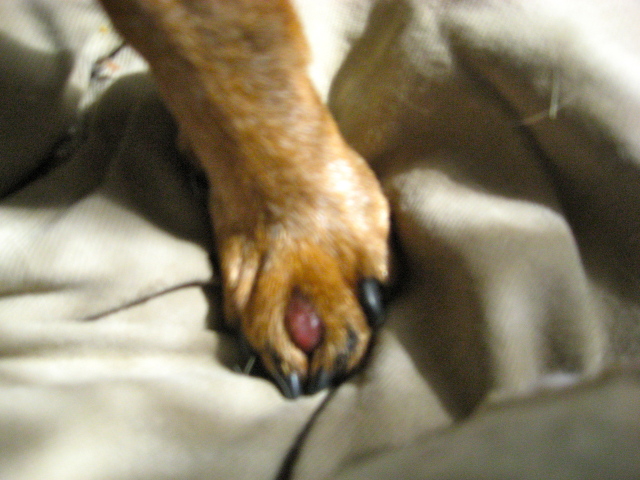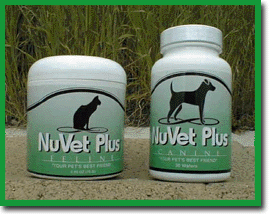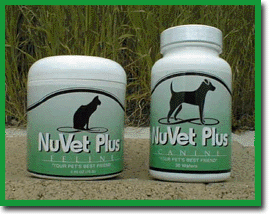QuestionCheemo is a very large 8 yr old white sheppard. He's been licking one of his paws raw for the past few years. The affected area has never spread to any other part of his body.
My aunt Jacquie is his owner (I dog sit and have him often) and she's taken him to the local vet a number of times in the past 2 years. Different ointments from the vet have been tried but have not worked. The vet was unable to provide a diagnosis. The vet also put one of those "cones" on Cheemo to try to prevent him from licking the affected area, but the dog somehow managed to get at the area anyway.
An elderly aunt made Cheemo a salve (we're North American Indians) and it worked, but he went back to licking the area raw after we stopped using the ointment (which is now all gone and difficult to get more of).
All we've been doing lately is frequently spraying the affected area with sea salt water in order to try to prevent infection from setting in.
What could possibly be causing the problem and how do we treat (cure) it?
Any information/suggestions would be appreciated. Anxioulsy awaiting your reply.
Mandy & Jacquie & Cheemo
AnswerHello Mandy -
Your dog has an ailment known as Acral Lick Dermatitis. Acral lick dermatitis (also called lick granuloma) in dogs is a condition which develops as a result of excessive, chronic licking. It usually occurs on the front part of the lower leg, often over the carpus or metacarpus. The constant licking causes inflammation in the skin and, over time, the skin in that area becomes thickened. Because the dog continues to lick, the area can not heal and may become red, raised, and ulcerated. It is likely that the licking and the inflammation also cause the area to be itchy, which causes more licking, and starts an itch-lick cycle.
Although any dog can develop a lick granuloma, it commonly occurs in middle-aged, large breed dogs, such as the Doberman Pinscher, Labrador Retriever, Golden Retriever, Great Dane, Irish Setter, German Shepherd, and Boxer.
It is thought that the act of licking causes the release of endorphins (chemical substances which provide a sense of well-being) in the dog's brain. The dog soon learns that licking brings about this pleasant feeling, and keeps on licking. In other situations, there may be an underlying cause for the licking including allergies, skin mites, fungal infections, arthritis, trauma, foreign bodies, tumors, and neurological disease. There can also be psychological components, such as boredom, stress, and separation anxiety. It is important to accurately determine the cause of the licking, in order to treat effectively.
Often, along with a lick granuloma, there will be a bacterial infection in the skin. The moisture from the licking can cause overgrowth of the normal skin bacteria. This can increase the itchiness. Until the bacterial infection is resolved, it will be difficult to get the dog to stop licking so that the area can heal.
My Golden Retriever suffers from this ailment as well and I have gotten it under control. It took a while and was a little frustrating but I finally helped him. Vets will give creams but never treat the underlying cause which is behavioral/emotional. This is not to say that your pet is depressed or in sorrow but I believe more of a chemical imbalance. Anti-biotic creams are pointless and never really heal the area to begin with.
Here's what you can do to help Cheemo. First, begin by adding Garlic powder to his food. Garlic is an anti-microbial and will help fight and kill bacteria and infection present within the body. Don't be afraid to sprinkle it with a heavy hand, dogs love Garlic and Cheemo should eat it right up. The only draw back to adding Garlic to the food is flatulence. It may be a little stinky but the Garlic is doing its job by pushing the bacteria through the system. Just keep a couple clothes pins handy! This is safe and effective treatment for long term daily use. The Garlic will rid the body of bacteria should it be present from his licking.
To treat the "licked" skin, wash with Witch Hazel or Apple Cider vinegar. Both are anti-septics and will kill bacteria topically as well as soothe the skin from itching. After cleansed, apply a thin coat of Aloe Vera. Aloe will soothe and comfort the wound, allowing it not to itch and become inflammed. If Cheemo licks it, that's fine. Aloe heals from the inside out and will benefit him either way.
I have studied Native American medicine, as my Grandmother was an Herbalist as well. Your aunt probably made a cream of Calendula, Goldenseal, Gotu Kola, Echinacea and other soothing yet stimulating herbs in a Vitamin E oil or bees wax base. Any of these herbs are good to use for inflammation and skin irritation but will not cure the problem. To CURE Cheemo you will need to focus on the mental aspect of the illness.
I use the Bach Flower Essences for this purpose. I gave my dog CHESTNUT BUD in his water along with MIMULUS, VERVAIN and WILD OAT. I also made a glycerin tincutre of Oatstaw which I added to his food daily. It took about 2 (two) months BUT it worked and he has been fine now for 3 (three) years. There are many flower essences available, you will need to reserach them to see which ones are best for Cheemo. If you want more help, I will leave my contact information at the bottom of this response.
Do not overdo it on the Sea Salt water. It is a very good cleanser but is very drying and may be casuing him to lick more. You may put the Elizabethan collar on him while applying the natural treatment. The area should not itch him after the cleansing so he should not want to go after it. You could also wrap it up. If the skin is beyond inflammed and almost raw, I recommed you apply Tea Tree Oil in place of the Aloe Vera and then wrap it in a thin layer of gauze so he doesn't lick it. Tea Tree tastes terrible so it may actually deter him.
I hope this information has helped you.
If you would like information on natural and herbal remedies for human and animal concerns please contact me at wintersaurora@yahoo.com and I will be happy to assist you. I also offer a catalog of specially formulated herbal remedies which I can send to you as well.
Thank you and peaceful blessings to you and your pet. Please keep me posted on Cheemo and if you want help with the Flower Essences, follow up with me.
Sincerely,
Sharon Hubbs, AHG
Certified Natural Health Consultant & Herbalist

 American Staffordshire with rash - very itchy!
QuestionHi Marie:
My Petey, who just turned seven is a
American Staffordshire with rash - very itchy!
QuestionHi Marie:
My Petey, who just turned seven is a
 hematoma between my dogs toes ; benadryl canine dosages ; seasonal canine allergies ;
QuestionBubble between my Dogs
QUESTION: My dog
hematoma between my dogs toes ; benadryl canine dosages ; seasonal canine allergies ;
QuestionBubble between my Dogs
QUESTION: My dog
 My Pregnant itchy Bulldog; crusty bulldog folds; cleaning bulldog face and folds; itching and scratching nuvet plus pet tabs:
QuestionI recently purchased Matilda.She is pregnant.Sh
My Pregnant itchy Bulldog; crusty bulldog folds; cleaning bulldog face and folds; itching and scratching nuvet plus pet tabs:
QuestionI recently purchased Matilda.She is pregnant.Sh
 boston terrier luxating patella; bosont terrier supplements;
QuestionQUESTION: I have a boston terrier that will soo
boston terrier luxating patella; bosont terrier supplements;
QuestionQUESTION: I have a boston terrier that will soo
 Hyper or High Anxiety Spaniel Mix?
Question
Rusty
Hello, I have adopted a Spaniel m
Hyper or High Anxiety Spaniel Mix?
Question
Rusty
Hello, I have adopted a Spaniel m